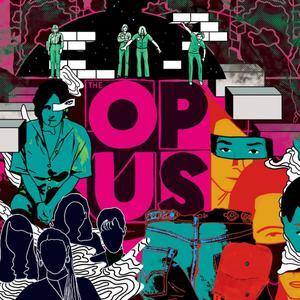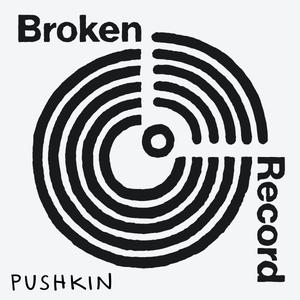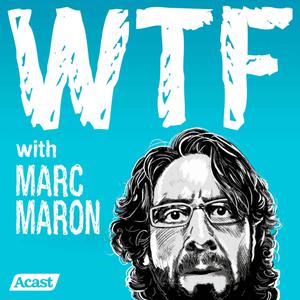
The Opus
Consequence Podcast Network
- 17 minutes 54 secondsHip-Hop 50: Cypress Hill’s Weed Rap Changed Cannabis Culture
In celebration of the 50th anniversary of hip-hop, we’re opening up The Opus podcast archives to re-release seasons focused on some of history's most legendary rap albums. Next up we revisit Cyrus Hills self-title record — a landmark of West Coast hip-hop that pioneered the “weed rap” movement. What’s more, Cypress Hill’s own B-Real, Sen Dog, and DJ Muggs all joined us for the journey through the album’s legacy.
For more from Cypress Hill, check out Sen Dog’s Crate Digging into 10 essential hip-hop albums.”, and there will be loads of artist interviews, essays, and more coming throughout the month, so make sure to check it all out at Consequence.net.
You can also snag some of our exclusive Hip-Hop 50 merch at the Consequence Shop.
Season 15 of Consequence Podcast Network and Sony’s The Opus comes to its conclusion on a high point as we explore how Cypress Hill put weed rap on the map.
Within a few months of its release, the impact of Cypress Hill and the subject matter of some of the raps therein was apparent. Other rappers started writing songs that expanded more on the glory of marijuana. While we think of Snoop Dogg and Dr. Dre as pioneers in the art of weed rap, it’s often forgotten that Dre once bragged on record about never smoking weed. But, after Cypress Hill lifted their veil of smoke, Dre got to work on an album called The Chronic.
And Cypress Hill’s cannabis candidness wasn’t just relegated to their raps, either. The group became outspoken advocates for the legalization of marijuana, ushering in a new era of pot positivity that Cypress Hill are still pushing forward to this very day.
Advertising Inquiries: https://redcircle.com/brands
Privacy & Opt-Out: https://redcircle.com/privacy25 August 2023, 8:00 am - 21 minutes 35 secondsHip-Hop 50: Cypress Hill Revolutionized Hip-Hop via Hard Rock and Latin Funk
In celebration of the 50th anniversary of hip-hop, we’re opening up The Opus podcast archives to re-release seasons focused on some of history's most legendary rap albums. Next up we revisit Cyrus Hills self-title record — a landmark of West Coast hip-hop that pioneered the “weed rap” movement. What’s more, Cypress Hill’s own B-Real, Sen Dog, and DJ Muggs all joined us for the journey through the album’s legacy.
For more from Cypress Hill, check out Sen Dog’s Crate Digging into 10 essential hip-hop albums.”, and there will be loads of artist interviews, essays, and more coming throughout the month, so make sure to check it all out at Consequence.net.
You can also snag some of our exclusive Hip-Hop 50 merch at the Consequence Shop.
On the previous episode of Consequence Podcast Network and Sony's The Opus Season 15, we explored the chemistry between the voices of Cypress Hill’s B-Real and Sen Dog. In Episode 3, we look at the unique alchemy of their beats.
The place where rock and metal meet has always been a part of Cypress Hill's sonic and cultural identity. Sen Dog's first concert was thrash-metal band Slayer; that band's drummer, Dave Lombardo (who, like Sen, is Cuban-American), was his high-school friend. At the end of "How I Could Just Kill a Man," someone quotes Suicidal Tendencies' "Institutionalized."
Cypress Hill's sound had its origins as much in hard rock as it did with Latin funk. The group put their guitar-based influences under every one of their raps.
In this episode, host Jill Hopkins and her guests talk about that intersection between rock and hip-hop, and examine how other artists found themselves at the center of the Venn diagram Cypress Hill first drew.
Original music by Tony Piazza.
Subscribe now so you can keep up on all the new Opus episodes. Also, keep an eye out for a special giveaway in the coming weeks to continue the celebration of the 30th anniversary of Cypress Hill.
Also, grab yourself an official Opus hoodie or T-Shirt at the Consequence Shop or using the buy-now buttons below.
Advertising Inquiries: https://redcircle.com/brands
Privacy & Opt-Out: https://redcircle.com/privacy23 August 2023, 8:00 am - 18 minutes 43 secondsHip-Hop 50: Cypress Hill’s Chemistry Made for Explosive Hip-Hop
In celebration of the 50th anniversary of hip-hop, we’re opening up The Opus podcast archives to re-release seasons focused on some of history's most legendary rap albums. Next up we revisit Cyrus Hills self-title record — a landmark of West Coast hip-hop that pioneered the “weed rap” movement. What’s more, Cypress Hill’s own B-Real, Sen Dog, and DJ Muggs all joined us for the journey through the album’s legacy.
For more from Cypress Hill, check out Sen Dog’s Crate Digging into 10 essential hip-hop albums.”, and there will be loads of artist interviews, essays, and more coming throughout the month, so make sure to check it all out at Consequence.net.
You can also snag some of our exclusive Hip-Hop 50 merch at the Consequence Shop.
Consequence Podcast Network and Sony’s The Opus Season 15 continues as we explore the unparalleled chemistry between Cypress Hill’s B-Real and Sen Dog. B-Real’s high-pitched, nasal rap style played off the boom of Sen Dog’s authoritative baritone for a sound unlike anyone else.
In Episode 2 of The Opus: Cypress Hill, the two rappers discuss finding their voices, while the legendary Chuck D (Public Enemy, Prophets of Rage) heaps praise on the group’s unique sound.
Advertising Inquiries: https://redcircle.com/brands
Privacy & Opt-Out: https://redcircle.com/privacy18 August 2023, 8:00 am - 17 minutes 18 secondsHip-Hop 50: Cypress Hill - Southern California Was a Cultural Powder Keg
In celebration of the 50th anniversary of hip-hop, we’re opening up The Opus podcast archives to re-release seasons focused on some of history's most legendary rap albums. Next up we revisit Cyrus Hills self-title record — a landmark of West Coast hip-hop that pioneered the “weed rap” movement. What’s more, Cypress Hill’s own B-Real, Sen Dog, and DJ Muggs all joined us for the journey through the album’s legacy.
For more from Cypress Hill, check out Sen Dog’s Crate Digging into 10 essential hip-hop albums.”, and there will be loads of artist interviews, essays, and more coming throughout the month, so make sure to check it all out at Consequence.net.
You can also snag some of our exclusive Hip-Hop 50 merch at the Consequence Shop.
Season 15 of The Opus, presented by the Consequence Podcast Network and Sony, travels back to the Southern California in which Cypress Hill’s sound exploded onto the scene.
The sonic sense of urgency in the hip-hop group's self-titled debut album was a time-and-place thing -- a product of late '80s/early '90s Los Angeles that was swept up in the tension just before the Rodney King verdict and the uprising that followed.
Cypress Hill's lyrics and beats were tailor made for the subwoofers in the trunks of the low riders that played them, and would echo around rap's landscape in the years to come. And it served as representative for the Black and brown voices who felt the need to protest as much as they felt the desire to party in the face of a community that would soon be national news.
In this first episode of The Opus: Cypress Hill, we venture into Cypress Hill’s Southern California, and the powder keg that made their debut album important, necessary, and seemingly ubiquitous. And who better to give host Jill Hopkins a tour of this era than the members of Cypress Hill themselves, as B-Real, Sen Dog, and DJ Muggs guest on Episode
Advertising Inquiries: https://redcircle.com/brands
Privacy & Opt-Out: https://redcircle.com/privacy16 August 2023, 8:00 am - 26 minutes 16 secondsHip-Hop 50: The Score - Fugees In the Lab
In celebration of the 50th anniversary of hip-hop, we’re opening up The Opus podcast archives to re-release seasons focused on some of history's most legendary rap albums. First up, we revisit Fugees’ classic The Score, which comes in at number 15 on Consequence’s list of the 50 Greatest Hip-Hop Albums of All Time. You can see the full list on Consequence, and there will be loads of artist interviews, essays, and more coming throughout the month, so make sure to check it all out at Consequence.net.
You can also snag some of our exclusive Hip-Hop 50 merch at the Consequence Shop.
Here on The Opus, we’ll also be re-releasing our season about Cypress Hill’s self-titled record, so make sure to check back every Wednesday and Friday for fresh episodes from the archives.
So much of hip-hop is built on the notion of creating something from something. Call it covering, call it borrowing, call it sampling, but don't call it unoriginal. For decades, samples have helped musicians turn some of greatest hits into even greater hits.
Fugees are no exception to this. They built upon this legacy, The samples and covers included on 1996's The Score range everywhere from The Delphonics to Enya -- and yet they’re seamlessly woven together to create a distinct, singular album.
In the Season 13 finale, host Jill Hopkins heads to the operating room to dissect three songs off The Score that best embody the art of the sample and the depth of knowledge the Fugees brought to the studio: "Zealots", "The Score", and "Ready or Not".
Surrounding Jill at the table with scalpels and insight are Ruffhouse Records co-founders Chris Schwartz and Joe Nicolo; rapper Psalm One; and music journalist Insanul Ahmed. Together, they discuss why certain bits were used, why whole songs were sometimes included, and how the Fugees turned existing classics into their own -- read: completely new -- classics.
Original music by Tony Piazza.
Advertising Inquiries: https://redcircle.com/brands
Privacy & Opt-Out: https://redcircle.com/privacy11 August 2023, 8:00 am - 21 minutes 13 secondsHip-Hop 50: The Score - Fugees In Haiti
In celebration of the 50th anniversary of hip-hop, we’re opening up The Opus podcast archives to re-release seasons focused on some of history's most legendary rap albums. First up, we revisit Fugees’ classic The Score, which comes in at number 15 on Consequence’s list of the 50 Greatest Hip-Hop Albums of All Time. You can see the full list on Consequence, and there will be loads of artist interviews, essays, and more coming throughout the month, so make sure to check it all out at Consequence.net.
You can also snag some of our exclusive Hip-Hop 50 merch at the Consequence Shop.
Here on The Opus, we’ll also be re-releasing our season about Cypress Hill’s self-titled record, so make sure to check back every Wednesday and Friday for fresh episodes from the archives.
The Fugees were culturally unique in myriad ways. They were a trio comprised of one American-born Black woman and yet also two Haitian immigrants, who both took pride in their heritage. Naturally, this pride was weaved into the fabric of 1996's The Score, and the album's success meant that they were able to champion Haitian music in both America and abroad.
In this episode, host Jill Hopkins speaks to the trio's family, friends, and fans about Haiti’s effect on the Fugees and the Fugees effect on Haiti, Haitians, and their fans who saw their own American immigrant and refugee experiences reflected back at them.
Along for the journey are award-winning songwriter and multi-instrumentalist Jon Batiste, producer Jerry Wonda, Ruffhouse Records co-founder Chris Schwartz, music journalists Dometi Pongo and Insanul Ahmed, and reggae legend Sly Dunbar. Together, they study the symbiosis between band and homeland as it pertains to the Fugees.
Original music by Tony Piazza.
Don't forget to enter our giveaway to win a Fugees prize pack, which includes vinyl, a turntable, and headphones. (Note: If you’re having trouble seeing the widget, enter here.)
Advertising Inquiries: https://redcircle.com/brands
Privacy & Opt-Out: https://redcircle.com/privacy9 August 2023, 8:00 am - 21 minutes 35 secondsHip-Hop 50: The Score - Fugees In the Basement
In celebration of the 50th anniversary of hip-hop, we’re opening up The Opus podcast archives to re-release seasons focused on some of history's most legendary rap albums. First up, we revisit Fugees’ classic The Score, which comes in at number 15 on Consequence’s list of the 50 Greatest Hip-Hop Albums of All Time. You can see the full list on Consequence, and there will be loads of artist interviews, essays, and more coming throughout the month, so make sure to check it all out at Consequence.net.
You can also snag some of our exclusive Hip-Hop 50 merch at the Consequence Shop.
Here on The Opus, we’ll also be re-releasing our season about Cypress Hill’s self-titled record, so make sure to check back every Wednesday and Friday for fresh episodes from the archives.
Instead of returning to the studio with outside producers, the Fugees took their $150k advance from Ruffhouse Records and ventured off to … the basement. Specifically, the Booga Basement in East Orange, NJ, where Wyclef Jean’s uncle and his cousin Jerry “Wonda” Duplessis lived.
Booga, along with The Dungeon in Atlanta (where OutKast cut their debut), were two of the most successful underground studios in the game circa the mid-90s. These locales came with a productive, family vibe and endless head bobs to judge the quality of work.
In this episode, host Jill Hopkins speaks to producer Jerry Wonda about building a studio and a sound that would continue the tradition of great New Jersey hip-hop. They also discuss why this kind of DIY ethos is so important to groups in the process of defining their sounds.
Also heading into the basement are special guests Chris Schwartz and Joe Nicolo of Ruffhouse Records, in addition to MTV’s Dometi Pongo and Genius executive editor Insanul Ahmed.
Original music by Tony Piazza.
Don't forget to enter our giveaway to win a Fugees prize pack, which includes vinyl, a turntable, and headphones. (Note: If you’re having trouble seeing the widget, enter here.)
Advertising Inquiries: https://redcircle.com/brands
Privacy & Opt-Out: https://redcircle.com/privacy4 August 2023, 8:00 am - 24 minutes 47 secondsHip-Hop 50: The Score - Fugees at the Crossroads
In celebration of the 50th anniversary of hip-hop, we’re opening up The Opus podcast archives to re-release seasons focused on some of history's most legendary rap albums. First up, we revisit Fugees’ classic The Score, which comes in at number 15 on Consequence’s list of the 50 Greatest Hip-Hop Albums of All Time. You can see the full list on Consequence, and there will be loads of artist interviews, essays, and more coming throughout the month, so make sure to check it all out at Consequence.net.
You can also snag some of our exclusive Hip-Hop 50 merch at the Consequence Shop.
Here on The Opus, we’ll also be re-releasing our season about Cypress Hill’s self-titled record, so make sure to check back every Wednesday and Friday for fresh episodes from the archives.
In the Season 13 premiere, we’ll find out what it took for a group in its own artistic and personal transition to find their place at the top of the charts and on the Grammy stage as the biggest hip-hop act of 1996.
Hip-hop had considerably changed from when the Fugees started recording their first album in 1992 to just three years later when they began working on their second effort. The “Golden Age'' was coming to a close, and the genre was at a crossroads.
So were the Fugees, though. Coming off their critically and commercially divisive first album, 1994's Blunted on Reality, the New Jersey trio of Lauryn Hill, Wyclef Jean, and Pras Michel were similarly looking to reinvent themselves
Join host Jill Hopkins as she dials the clock back to the mid-'90s alongside producer Jerry Wonda, Ruffhouse Records co-founders Chris Schwartz and Joe Nicolo, and rapper Psalm One.
Advertising Inquiries: https://redcircle.com/brands
Privacy & Opt-Out: https://redcircle.com/privacy2 August 2023, 8:00 am - 21 minutes 58 secondsThe Legacy of Billy's The Stranger Lives on at Madison Square Garden
While Billy Joel’s last studio album was released on August 10th, 1993, it was The Stranger that catapulted him to the iconic, internationally renowned venue he is happy to call home: Madison Square Garden. He first played there in 1978 and has since played there a record-shattering 133 times. Playing MSG is an accomplishment for any artist, but Joel's legacy includes selling out the iconic venue every month since 2014 -- and that's just part of what makes Billy Joel such a legend.
On Episode 4 of The Opus: The Stranger, we close out the season by taking a look at what came next for Joel after The Stranger: his incredible 50+ year career, his history-making residency at Madison Square Garden, and the enormous impact he’s had on his fellow musicians.
Presented by Consequence Podcast Network and Sony Legacy, host Adam Unze speaks with Regina Spektor, Ben Folds, Bayside's Anthony Raneri, Rozzi, The Arkells' Anthony Carone, Billy Joel's biographer Fred Schruers, Ken Weinstein, and Andrew McMahon and the Wilderness
Keep up to date with what's next from The Opus by liking, reviewing, and subscribing wherever you get your podcasts. You can also stream and download The Stranger here, and relive Joel's 1990 concerts at Yankee Stadium with the recently released Live at Yankee Stadium. To catch a more modern Joel concert -- including his co-headlining tour with Stevie Nicks -- get tickets here.
Fans of The Opus can show their love with an official Opus hoodie or T-Shirt, available now at the Consequence Shop.
Advertising Inquiries: https://redcircle.com/brands
Privacy & Opt-Out: https://redcircle.com/privacy12 January 2023, 9:00 am - 23 minutes 54 secondsBilly Joel's The Stranger Plays Like a Greatest Hits Album: The Opus
Many classic albums have their share of hits, but Billy Joel’s The Stranger is simply full of them. How did this happen in just about three weeks? The truth is none of the songs' paths overlapped and truths are often stranger than fiction. On Episode 3 of The Opus: The Stranger, we explore each of these classic tunes to discover what made them such lasting contributions to American music.
Presented by Consequence Podcast Network and Sony Legacy, this new episode digs into six of the album's classics with the help of archival interviews from the Billy Joel and producer Phil Ramone, plus host Adam Unze speaks with Regina Spektor, Ben Folds, Bayside's Anthony Raneri, The Arkells' Anthony Carone, and Andrew McMahon and the Wilderness
You can keep up with the rest of Season 19 by liking, reviewing, and subscribing to The Opus wherever you get your podcasts. You can also stream and download The Stranger here, and relive Joel's 1990 concerts at Yankee Stadium with the recently released Live at Yankee Stadium. To catch a more modern Joel concert -- including his co-headlining tour with Stevie Nicks -- get tickets here.
Fans of The Opus can show their love with an official Opus hoodie or T-Shirt, available now at the Consequence Shop.
Advertising Inquiries: https://redcircle.com/brands
Privacy & Opt-Out: https://redcircle.com/privacy5 January 2023, 9:00 am - 20 minutes 43 secondsBilly Joel and Producer Phil Ramone Captured Collaborative Magic on The Stranger
The Stranger wasn't only Billy Joel’s critical breakthrough, but it was the start of a decade-long creative partnership with producer Phil Ramone. Together, the two created some of the most lasting songs in music, and it all began with those first sessions in the summer of 1977.
Joel had a specific vision for what would be his fifth studio album, and that meant finding the right person to work the boards. It wasn't until Ramone -- known then for hits like "It's My Party" in the '60s and working with Paul Simon in the '70s -- expressed his enthusiasm for working with Joel's touring band that the Piano Man knew he'd found his producer.
Together, they captured the energy of a Billy Joel concert on tape, with Joel's band pounding away live in studio (leading to utterly in-the-room sound leakage). Add in Ramone's innovative recording techniques, and they were able to fully realize the sound that had always been in Joel's head. It was a collaborative environment that allowed the best of everyone to come out and led to one of the best albums in the history of music.
Presented by Consequence Podcast Network and Sony Legacy, Episode 2 of The Opus: The Stranger explores how working with Ramone allowed Joel to ascend to a new level of legend. In addition to archival interviews from the two icons, host Adam Unze speaks with Ben Folds, Joel's drummer Liberty DeVito, Arkells' Max Kerman, Andrew McMahon and the Wilderness, and Rozzie.
Keep up with the rest of Season 19 by liking, reviewing, and subscribing to The Opus wherever you get your podcasts. You can also stream or download The Stranger here, and check out the recently released Live at Yankee Stadium, capturing Joel’s 1990 two-night stand at famed stadium.
Fans of The Opus can show their love with an official Opus hoodie or T-Shirt, available now at the Consequence Shop. Snag tickets to Joel's upcoming concerts, including a 2023 co-headlining tour with Stevie Nicks, here.
Advertising Inquiries: https://redcircle.com/brands
Privacy & Opt-Out: https://redcircle.com/privacy29 December 2022, 9:00 am - More Episodes? Get the App
Your feedback is valuable to us. Should you encounter any bugs, glitches, lack of functionality or other problems, please email us on [email protected] or join Moon.FM Telegram Group where you can talk directly to the dev team who are happy to answer any queries.
 The Daily
The Daily
 Broken Record with Rick Rubin, Malcolm Gladwell, Bruce Headlam and Justin Richmond
Broken Record with Rick Rubin, Malcolm Gladwell, Bruce Headlam and Justin Richmond
 Something About the Beatles
Something About the Beatles
 WTF with Marc Maron Podcast
WTF with Marc Maron Podcast
 Song Exploder
Song Exploder
 Sound Opinions
Sound Opinions